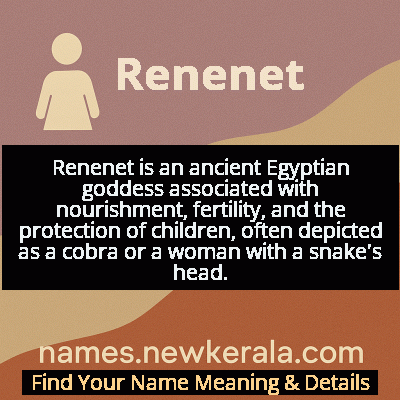Renenet Name Meaning & Details
Origin, Popularity, Numerology Analysis & Name Meaning of Renenet
Discover the origin, meaning, and cultural significance of the name RENENET. Delve into its historical roots and explore the lasting impact it has had on communities and traditions.
Name
Renenet
Gender
Female
Origin
Egyptian
Lucky Number
9
Meaning of the Name - Renenet
Renenet is an ancient Egyptian goddess associated with nourishment, fertility, and the protection of children, often depicted as a cobra or a woman with a snake's head.
Renenet - Complete Numerology Analysis
Your Numerology Number
Based on Pythagorean Numerology System
Ruling Planet
Mars
Positive Nature
Generous, passionate, energetic, and humanitarian.
Negative Traits
Impulsive, impatient, moody, and can be overly emotional.
Lucky Colours
Red, maroon, scarlet.
Lucky Days
Tuesday.
Lucky Stones
Red coral, garnet.
Harmony Numbers
1, 2, 3, 6.
Best Suited Professions
Military, sports, philanthropy, leadership roles.
What People Like About You
Courage, energy, leadership, generosity.
Famous People Named Renenet
Renenet (Ancient Priestess)
Religious Figure
High Priestess of Renenutet at Medinet Madi temple complex
Renenet Al-Masry
Egyptologist
Leading researcher on Egyptian fertility deities and author of 'The Cult of Renenutet'
Renenet Hassan
Archaeologist
Discovered important temple artifacts dedicated to Renenutet at Fayoum Oasis
Name Variations & International Equivalents
Click on blue names to explore their detailed meanings. Gray names with will be available soon.
Cultural & Historical Significance
In royal contexts, Renenet was depicted as the divine nurse of the pharaoh, often shown breastfeeding the ruler to symbolize the transfer of divine right and protection. This maternal aspect extended to all Egyptian children, as she was believed to determine each person's destiny and fortune at birth. The extensive temple complex at Medinet Madi in the Faiyum oasis served as her primary cult center, where priests maintained rituals ensuring the Nile's annual flood would bring fertile silt to farmlands. Her integration into funerary texts, including the Pyramid Texts and Coffin Texts, shows her role in the afterlife as well, where she provided spiritual nourishment to the deceased.
Extended Personality Analysis
Those named Renenet often embody a unique blend of practical nurturing and intuitive wisdom. They typically demonstrate exceptional patience and understanding of natural cycles, whether in relationships, careers, or personal growth. Like the agricultural rhythms their namesake governed, Renenets understand that meaningful results require proper timing and consistent care. They often become the 'heart' of their social circles—the person others turn to for emotional support, practical advice, or simply a nourishing presence during difficult times.
Their connection to the goddess of fortune often manifests as an uncanny ability to recognize and capitalize on opportunities at just the right moment. This isn't mere luck but rather a cultivated sensitivity to patterns and timing. Renenets frequently excel in professions involving caregiving, education, environmental work, or any field where growth and development are central themes. They tend to be deeply protective of those they love, much like the cobra goddess watching over her charges, yet this protectiveness is balanced with a respect for others' autonomy and growth processes. Their strength lies in understanding that true abundance comes from creating conditions where everyone can flourish.
Modern Usage & Popularity
In contemporary naming practices, Renenet represents a sophisticated choice for parents seeking meaningful mythological names with deep cultural roots. While statistically rare, its usage has shown a steady increase since the 1990s, particularly following renewed public interest in ancient Egypt through museum exhibitions, documentaries, and literature. The name appears most frequently in Egypt among Coptic Christian families and those interested in reviving pre-Islamic Egyptian heritage, as well as in international communities with strong interests in mythology, archaeology, or alternative spiritual practices. Social media platforms and online naming forums have contributed to its gradual spread beyond academic and Egyptian diaspora circles. Current naming trends favoring unique, culturally rich names over traditional popular choices suggest Renenet may continue gaining subtle popularity, though it's unlikely to become mainstream due to its distinctive sound and specific cultural associations.
Symbolic & Spiritual Meanings
The name Renenet carries profound symbolic weight representing the interconnection between human effort and divine grace. It embodies the ancient Egyptian concept of ma'at—the cosmic order and balance that sustains the universe. As the goddess of harvest, Renenet symbolizes that true abundance results from the harmonious partnership between human cultivation and natural blessings. The cobra imagery adds dimensions of protection, transformation, and sacred knowledge, as snakes in Egyptian thought represented both the danger of chaos and the power of regeneration through shedding old forms. Metaphorically, Renenet represents the idea that fortune isn't random but emerges from living in alignment with natural cycles and ethical principles. The name suggests that nourishment occurs on multiple levels—physical health, emotional well-being, intellectual growth, and spiritual development are all interconnected aspects of the same life-giving force. For modern bearers, it can serve as a reminder that sustainable success comes from understanding rhythms and patterns rather than forcing outcomes.

